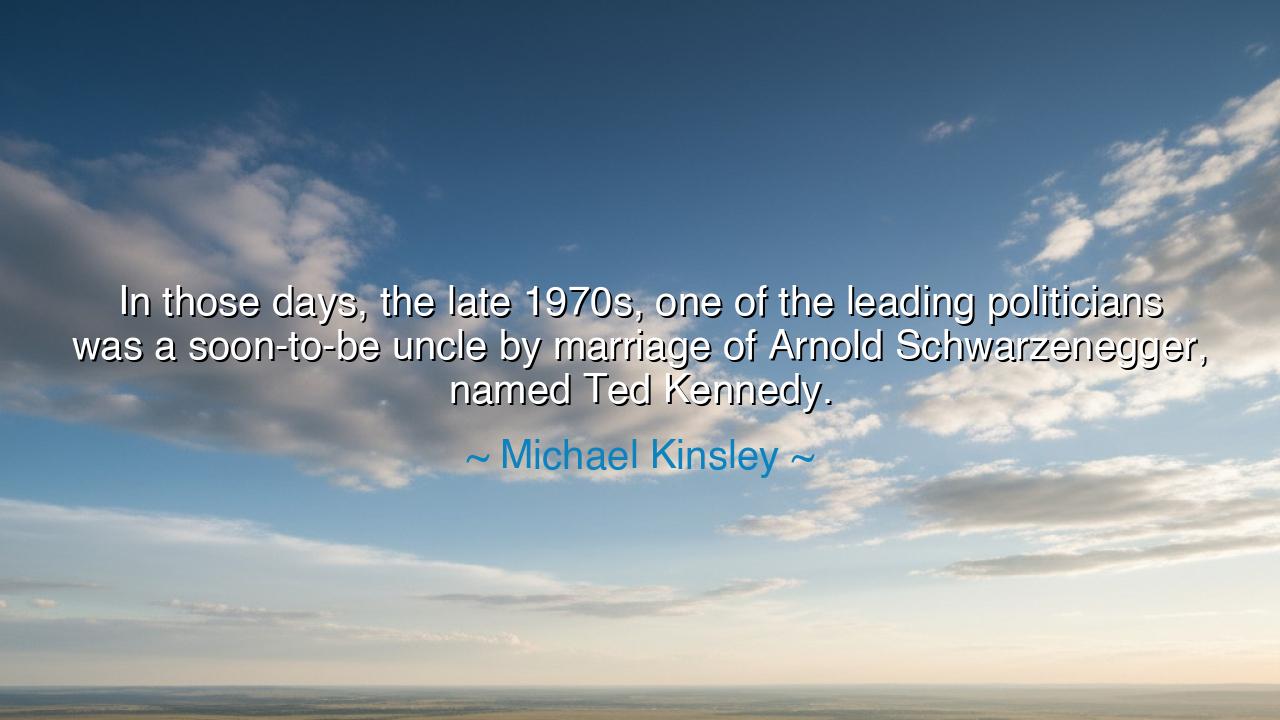
In those days, the late 1970s, one of the leading politicians was
In those days, the late 1970s, one of the leading politicians was a soon-to-be uncle by marriage of Arnold Schwarzenegger, named Ted Kennedy.






In the swirling currents of history, there are moments when the paths of seemingly disparate figures converge, shaping the future in ways that may seem inconsequential at first, but which, over time, reveal their significance. Michael Kinsley’s words—"In those days, the late 1970s, one of the leading politicians was a soon-to-be uncle by marriage of Arnold Schwarzenegger, named Ted Kennedy"—speak not only to the personal connections that define political landscapes but to the deeper currents of legacy, influence, and the complexity of power. Ted Kennedy, a titan of American politics, and Arnold Schwarzenegger, an Austrian immigrant turned Hollywood star, both stand as symbols of how personal connections often shape not only individual destinies but also the broader political and cultural landscapes of their time.
In the ancient world, such interwoven destinies were often seen as the forces of fate, as the gods themselves, weaving the threads of human lives with purpose and intention. Plato, in his writings, often explored how the lives of great individuals were shaped by both their own choices and the forces beyond them. Just as Alexander the Great rose to power not just through military might but through the connections he formed with powerful allies, so too did Ted Kennedy’s political influence grow through his ability to navigate the intricate web of familial ties, public service, and personal ambition. Arnold Schwarzenegger, much like the heroes of ancient myth, transcended the boundaries of his origins to become a figure who shaped both politics and popular culture in unexpected ways.
Ted Kennedy, a man whose name would be etched into the annals of American history, carried the weight of the Kennedy legacy, a family of influence and tragedy that shaped the political and social fabric of the 20th century. His career in the U.S. Senate, marked by his championing of social justice, healthcare, and civil rights, embodied the power of public service and the long-term commitment to change. The Kennedy family, with its tragedies and triumphs, exemplified how personal legacy and public duty are inextricably linked. Through his relationships and political maneuvering, Ted Kennedy was able to wield tremendous influence, yet his personal life, including his connection to Schwarzenegger, illustrates how even the most powerful figures are often tied to the ordinary and the unexpected.
Similarly, Arnold Schwarzenegger, whose rise from a humble bodybuilder to a global superstar and later to the Governor of California, underscores the profound impact of personal transformation. His marriage to Maria Shriver, a member of the Kennedy family, symbolizes the ways in which the most seemingly unrelated figures can shape and influence each other. In Schwarzenegger’s ascent, we see the modern-day story of an immigrant who became an American icon, much like the heroes of old who ventured from humble beginnings to achieve greatness. But the very fact that he would be married into the Kennedy family underscores how the realms of entertainment, politics, and public life often intertwine in ways that shape history, sometimes in unexpected and striking ways.
The significance of Kinsley’s quote lies in its reflection of the complexity of influence. Ted Kennedy’s political power and Arnold Schwarzenegger’s celebrity status may have seemed worlds apart, but both were tied to larger social and political currents that shaped the fabric of their respective eras. In much the same way that Plato’s Republic sought to understand the dynamics of leadership and justice in society, the lives of Kennedy and Schwarzenegger offer a microcosm of how connections—whether through family, politics, or public life—often guide individuals toward power and influence. Schwarzenegger’s eventual political career, serving as Governor of California, was a direct result of his public image and familial ties, illustrating how personal relationships can propel individuals into positions of power.
From these reflections, the lesson is clear: we must understand that connections, whether familial, political, or personal, have the potential to shape destinies in ways that transcend the immediate. The stories of Ted Kennedy and Arnold Schwarzenegger show us that power and influence are not always born from singular achievements but from the ability to navigate and harness relationships that connect us to something larger. Leadership, whether in politics, entertainment, or public life, is often a product of interconnected lives, where actions ripple outward, affecting the course of history.
As you reflect on your own path, consider the connections you form in life. Like the ancients who believed that our fates were shaped by the gods and by our relationships with others, we must understand that every interaction, every bond, holds the potential to lead us toward new opportunities for growth, influence, and legacy. Whether you seek to lead, to serve, or simply to live a life of purpose, recognize the power that lies in the relationships you nurture and the influence they can bring. For, in the end, it is not just the path we choose, but the connections we make along the way that shape our legacy and the world we leave behind.






AAdministratorAdministrator
Welcome, honored guests. Please leave a comment, we will respond soon